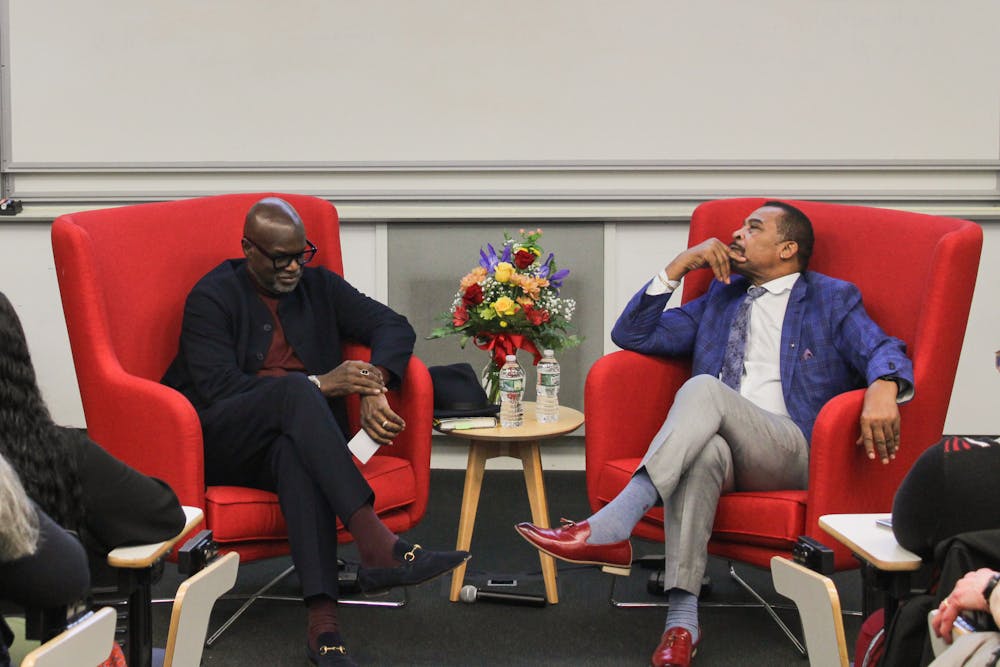The second annual W.E.B. Du Bois Lecture in Public Social Science occurred on Feb. 23 at the Annenberg School for Communication.
The lecture, which was held on Du Bois' birthday, honored his legacy as a leading sociologist, historian, political scientist, anthropologist, and economist. Aldon Morris, the Leon Forrest Professor of Sociology and African American Studies at Northwestern University, spoke in conversation with Penn Lasry Family Professor of Race Relations Tukufu Zuberi.
W.E.B. Du Bois conducted most of his research, particularly his seminal work "The Philadelphia Negro," at Penn during the 1890s. The Department of Sociology, Annenberg School, Center for Africana Studies, and Wharton School's Coalition for Equity and Opportunity co-sponsored the lecture, which highlighted Du Bois' pivotal impact at the University and throughout history.
Morris is the author of the 2015 book "The Scholar Denied: W.E.B. Du Bois and the Birth of Modern Sociology." In his address, Morris spoke about the racial prejudice Du Bois faced during his time in academia.
"Though W.E.B. Du Bois was a founder of scientific sociology, because he was Black and his ideas were very different from those of the mainstream, he was considered to have dangerous ideas," Morris said.
Morris described how discrimination thwarted Du Bois' professional advancement. Despite Du Bois attending Penn for his graduate studies, Morris said that the University did not offer him a job because of its nature as a predominantly white institution. He added that Harvard University also did not hire Du Bois, despite him being the first Black person to obtain a Ph.D. from the university.
Morris then explained that although Du Bois had a strong commitment to moral activism, his ideas were not always well received. For example, Morris said that Du Bois' advocacy for nuclear disarmament was met with severe backlash.
"Du Bois was acutely aware that this was a dangerous move to humanity, so he organized with others against nuclear weapons," Morris said. "And because he did that, the State Department accused him of being an agent of a foreign government. He was arrested. He was handcuffed."
RELATED:
Institutional racism and minimal recognition: Inside Du Bois’ complicated history at Penn
Inaugural W.E.B Du Bois lecture aims to honor Du Bois’ legacy at Penn with guest speaker
Morris emphasized the imperative for academic institutions to heed the lessons of history and redouble efforts toward inclusivity. Acknowledging the progress made in fostering diversity, Morris said that University leadership and students must make an active effort to ensure all marginalized communities are being equally represented.
"There has been some evolution in a progressive way. At the same time, it is very clear that we do not have nearly enough African American scholars, Native American scholars, scholars from poor communities, and so forth," Morris said. "Education is impoverished when you do not have all the perspectives being placed on the table and being debated."
Morris urged universities like Penn to advocate further for free speech protection, bolster support for disadvantaged students through increased scholarship opportunities, and enhance the representation of diverse cultures within sociology departments.
"There are other places that are moving forward in this direction," Morris said. "Harvard is doing some, Brown is doing some, and so hopefully, the University of Pennsylvania will once again not be left behind."
The inaugural W.E.B. Du Bois Lecture took place last year, also on Feb. 23. It featured Brent Staples, a member of the New York Times editorial board, in conversation with Zuberi.









